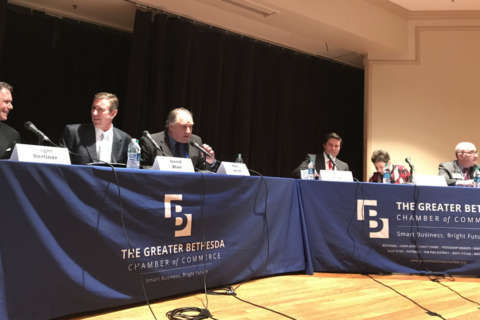WASHINGTON — Montgomery County governs the sale of alcohol more closely than any county in the nation. While that control has caused problems in the past, private county businesses that sell beer and wine see improvements — but say the government’s operation needs more changes.
The county Department of Liquor Control has a monopoly on the wholesale distribution of all alcohol, and retail sale of spirits.
Over the recent holiday season, many restaurants, bars and beer and wine shops say they received adequate county shipments of popular wines, unlike in years past, when shipments left them without the wines customers wanted.
“There have been many improvements by the Department of Liquor Control in their wholesale operations,” said Peter Frank, who has owned and operated Talbert’s Ice and Beverage on River Road in Bethesda, for the past 62 years.
Complaints by private dealers sparked an overhaul at the county’s alcohol warehouse.
“We’ve made some pretty serious improvements in our warehouse operations,” said Bob Dorfman, who is marking his anniversary this month as the director of the Department of Liquor Control. “We’ve reconfigured our warehouse; we’ve added additional racking; we’ve employed new technologies that hadn’t existed in the warehouse before.”
There’s been a concerted effort to modernize wholesale operations, including the county’s fleet of delivery trucks.
The operations of the agency, which traces its history to the 1930s and the end of Prohibition, are convoluted, but the DLC makes room for some private businesses to sell alcohol by allowing convenience stores, such as Talbert’s, to sell wine and cold beer. While county stores are the only stores that sell spirits, beer and wine, the beer is sold warm.
At the government-run stores, the DLC has sought to streamline inventory and boost sales.
“We changed not only our pricing strategy but our product strategy as well,” said Dorfman. Far fewer wines are being put on sale, but the sale prices are more significant than the broadly discounted prices of the past.
Private sellers complain that the DLC price strategies are unfair, with county stores selling some wine brands close to the cost of what private sellers are paying wholesale.
“The government-run stores, which are called dispensaries, are unfair competition to us — the beer and wine retail stores,” said Frank, who added that the unfairness lies in the county-run stores’ ability to set wholesale and retail prices.
“They’re unfair competition because they have a dual price advantage,” Frank said.
“We have every right to determine what items we’re going to put on sale and for what price,” countered Dorfman; “Independent retailers pay exactly the same price as our retail stores pay.”
The county liquor control system generates about $30 million a year in revenue, but those inside and outside government have raised questions about whether the county should give up its iron grip on alcohol sales.
At a candidate’s debate late last year, a majority of the six candidates running for Montgomery County executive said they were open to the idea of getting the county out of the business.








